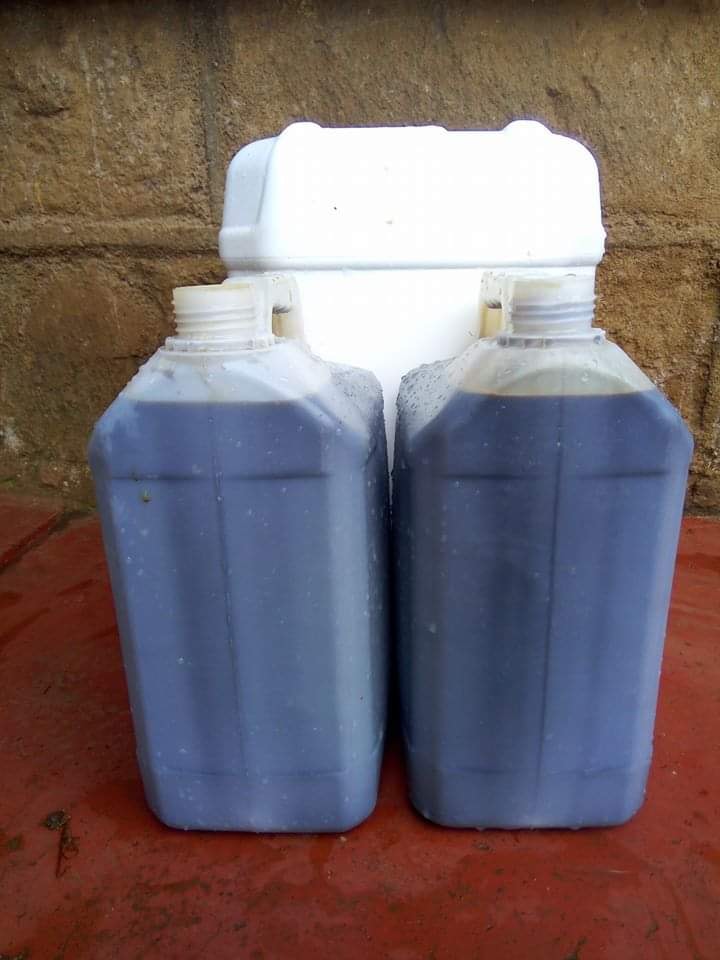George Muturi (right) with fellow farmer at his Lari vermiculture farm in Kiambu County. Photo courtesy.
After completing his form four education level in 2013, George Muturi due to lack of fees to continue with his education decided to venture in poultry and rabbit rearing but would later drop the rabbits for vermiculture (rearing of earthworms), a venture which is currently earning him over Sh45,500 a month.
Muturi says the idea or worm rearing was sold to him in 2015 by an officer at International Centre for Insect Physiology and Ecology (ICIPE) when he when to buy black soldier eggs to hatch, raise them to larvae stage and feed his chicken.
“The idea seemed less expensive to establish and profitable, I, therefore, decided to sell all my rabbits and restructure the animals’ cage at Sh500 to make it fit for worms before buying five kilos of red-worms at Sh2,500 from a fellow farmer,” said the vermiculturist from Lari, Kiambu County.
Muturi says the venture has been easy to run because he feeds the worms on household or farm wastes as they convert the wastes into an affordable organic fertiliser called vermicompost and organic foliar called vermiliquid that he sells to other farmers for crop production.
“Farmers especially those who run kitchen gardens like the two products of vermiculture which are dark, rich, earthly smelling fertilizer and foliar that amends the soil as they are full of both primary and micronutrients readily available to plants,” said Muturi.
RELATED ARTICLE: How to set a simple vermiculture system for your kitchen garden
According to Dr.Freddie Acosta, a Senior Lecturer of Technology and Innovation Management at Strathmore Business School, worm casting also improves the physical property of the soil by improving tilt, ferocity and moisture-holding capacity of the soil.
“Researchers have found out that adding vermicompost and vermiliquid to soil reduces insect pests and plant diseases in a certain field and greenhouse crops including corn, wheat, pea, cucumber, and tomato,” said Acosta.
It is advisable that farmers dilute the vermiliquid with water before applied to plants as it is a highly concentrated liquid and they are found to increase quality and quantity of yield per acre.

Vermiliquid.
RELATED ARTICLE: Worms\’ liquid offers crops more nutrients than fertilisers
Acosta says rearing the worms is cost-effective as they consume food equivalent to their body weight every day and are hermaphrodites meaning each earthworm contains both male and female sex. They double their number every month.
“One kilogram of earthworms (approx. 1500 worms) fed very well and given the right moisture and protection from predators at the beginning of January, can multiply and increase their number to approximately 4000 kilograms at the end of December.”
After a year of rearing, a farmer can produce up to three tonnes of organic fertiliser every day.
For Muturi, he harvests 100-150 kilos of vermicompost and 80-100 litres of vermiliquid a month. He sells a kilo of vermicompost at Sh70 and a litre of vermiliquid at Sh150 resulting to Sh25,500 a month.
RELATED ARTICLE: Farmer ventures into earthworms farming to fix tired soil
He also sells the 10 kilos of the worms to other farmers every month at Sh2,000 making Sh20,000 a month.
Besides red worms, he has also started domesticating African Nightcrawlers which are also excellent vermicomposting and fishing worm.
He has of late designed a simple three-in-one vermiculture system for kitchen gardens using three buckets that enable farmers rear the worms and collect vermicompost and vermiliquid in separate buckets.
This he installs to farmers at Sh4,500 for the 20-litre buckets and Sh6,000 for the 50-litre bin.
Muturi can be reached on 0717411668/ 0727675682